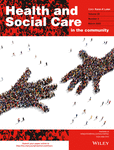An Australian study on the benefits of pastoral care to aged care residents in Christian affiliated homes
Abstract
This study aimed to understand the experience of pastoral care (PC), that is, the provision of support, comfort and spiritual counselling, from the perspective of Australian aged care residents. A survey research design captured feedback on participants’ PC experience. Outcomes were reported by 575 residents (aged 53–102) across 41 sites. The majority perceived that they received a high quality of care (92%) and benefited from their meeting with the pastoral practitioner (80%), ‘often’ or ‘all of the time’. A few significant differences were found based on participants’ gender, spirituality (i.e. connection and meaning), religiosity (i.e. faith beliefs and religious practices) and well-being. Females and participants who identified as both religious and spiritual were more likely to feel that their faiths/beliefs were valued. Those with greater psychological well-being, as defined by the World Health Organisation (1998), were more likely to report receiving a high quality of care and greater benefits from receiving PC than those with poorer well-being. Three overarching themes and eight subthemes were identified from the open-ended responses: 1) personal qualities of the pastoral practitioner; caring, supportive, understanding and empathetic; 2) pastoral practitioner met specific needs; spiritual and religious, friendship and company and assistance, advice and help; and 3) positive impact on the participant; feeling listened to, peaceful and valued, accepted and respected. The qualitative findings resonate with Maslow's Hierarchy of Needs, to feel safe, belong and have self-esteem. There was a synergy between what participants desire in the care they receive, as expressed in the open-ended questions, and what the pastoral practitioners provide, as indicated in the quantitative findings. A study strength was its mixed-method, multi-site and cross-organisational context, enabling PC to be explored across a diverse sample. Future research should consider a pre- and post-test survey to more comprehensively capture the impact and benefits of PC.
CONFLICT OF INTEREST
Three of the authors are managers at the residential aged care sites where the study was conducted.




